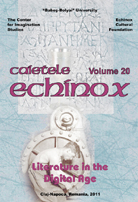Alternative Spaces in the Stories of Dunyazad, of the Slave Rashazad and of King Shahzaman
Alternative Spaces in the Stories of Dunyazad, of the Slave Rashazad and of King Shahzaman
Author(s): Marius ConkanSubject(s): Literary Texts
Published by: Universitatea Babeş-Bolyai
Keywords: One thousand and one nights; Narrative techniques; Frame-story; Multiple spatiality; Metamorphosis.
Summary/Abstract: The exemplary accomplishment of the storytellers of Cluj lies in the original construction of the frame-story. If in One Thousand and One Nights, Shahrazad told stories in order to subdue Shahryar, as we shall see later, to an metamorphosed identity, in the frame-story belonging to the authors of Cluj, Dunyazad, Shahrazad’s sister and the slave Rashazad are the storytellers. The latter was invented by Ruxandra Cesereanu and fulfils a fundamental function: Rashazad is the one who goes to the suk (an Arabian marketplace) every day to collect the stories that Dunyazad will tell King Shahriyar, should her sister, Shahrazad, fall asleep. Shahzaman, King Shahriyar’s brother, and the spiritual leader Tumidar join with these two storytellers, both bringing their contribution to the unity of the frame-story and to the configuration of certain narratologic and cognitive significations which, I will thoroughly present in what follows, commencing with the innovating book of Richard van Leeuwen, The Thousand and One Nights. Space, travel and transformation, published in 2007.
Journal: Caietele Echinox
- Issue Year: 2011
- Issue No: 20
- Page Range: 287-291
- Page Count: 6
- Language: English
- Content File-PDF

